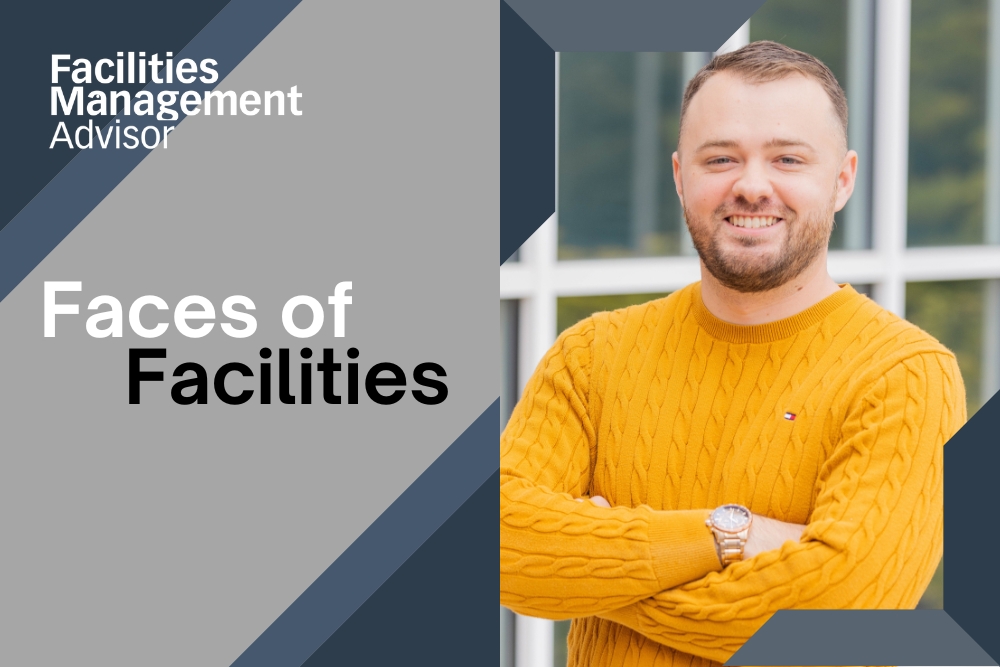As a regional facilities manager at major real estate services firm Jones Lang LaSalle (JLL), Sam Horton oversees a leading tech company’s properties across San Francisco. With a vast portfolio exceeding 4.6 billion square feet under management, Chicago-based JLL provides comprehensive services worldwide. In his role, Horton is in charge of over a dozen client buildings in the San Francisco region totaling about 2.3 million square feet. Among other duties, he manages facility operations, mailroom services, reception, and event setup.

Horton has been in the facilities management industry for roughly 12 years. Prior to joining JLL, he held roles at a large automaker supplier, BlueCross BlueShield of Illinois, the Illinois Department of Central Management Services, and Fairlawn Real Estate.
Horton is highly involved with the International Facility Management Association (IFMA), having volunteered in leadership roles. He currently serves as chapter president of the IFMA Central Illinois Chapter and North Central regional lead for IFMA Young Professionals. Notably, during his 2021-2023 tenure as secretary on the IFMA Public Sector Council Board of Directors, Horton’s team received the Council of the Year award in 2023. Horton has also earned IFMA’s Facility Management Professional (FMP) and Sustainability Facility Professional (SFP) certifications.
To learn more about Horton and his take on industry issues, please read the “Faces of Facilities” interview below:
How did you get your start in the field?
Like many in facilities management, my career path took an unforeseen turn. After graduating high school, I juggled work and studies, working the second shift on an assembly line at a major automotive supplier while attending college in the mornings. During the spring, I volunteered for a company-sponsored disaster relief trip to southern Indiana, where we helped rebuild homes damaged by a tornado. This trip fostered connections with other volunteers and led to introductions with the director of human resources and plant engineer. Upon returning, I was offered an unexpected opportunity—a project engineering role overseeing construction projects, all while continuing my education. Taking this role solidified my passion for facilities management.
What’s your best mistake, and what did you learn from it?
My early career involved extensive data analysis for process improvements and space optimization. Leading a project, I presented my findings to senior management. While eager to showcase my work, I lacked the experience of a seasoned professional. When asked for specifics, I relied on anecdotal evidence rather than concrete data. This experience, however, proved invaluable. My senior manager reminded me, “You’re an engineer—data validation is essential for success.” This became a guiding principle, particularly as an individual contributor. By prioritizing data validation, I developed the confidence to deliver impactful presentations to leadership.
What are some of the biggest facilities management issues at your organization?
The challenges we face are shared globally. Since the COVID-19 pandemic, organizations have scrambled to adapt to changing workforce demands, including the rise of hybrid and remote work models. To optimize their real estate portfolios and align them better with business goals, companies are focusing on strategic space utilization. Additionally, the rapid advancement of technology and artificial intelligence (AI) has compelled organizations to adopt these new technologies. However, talent shortages and an aging workforce with limited technology experience pose significant challenges to this adoption.
What’s your favorite part about working in the industry?
Facilities management isn’t just about keeping the lights on and the floors clean (although that’s important too!). What really gets me going is the constant challenge. The needs of a building and its users are always changing, and it’s up to me to find creative solutions to keep everything running smoothly. It’s like a giant puzzle with new pieces appearing every day, and I love figuring out how to make them all fit together. This dynamic environment keeps things fresh and exciting—there’s always a new problem to solve or a new way to improve things.
What changes would you like to see in the FM industry?
One of the most pressing challenges facing the FM industry over the past decade has been attracting the next generation of workers. In recent years, there have been significant efforts to make FM a more attractive career choice for young professionals, while also promoting diversity, equity, and inclusion. Examples of these initiatives include IFMA Young Professionals, Women in Facilities Management, and the FM Pipeline Team.
Where do you see the industry heading in five years? Are you noticing any major trends?
Building on recent years, facilities management is poised for even greater integration of technology and AI in the next five years. This trend will be driven by the desire for increased efficiency, cost savings, and improved occupant experiences. AI-powered systems will analyze vast amounts of data from sensors and building management systems, predicting equipment failures before they occur, optimizing energy use based on real-time occupancy, and even personalizing workplace environments for maximum comfort and productivity.
What are you most proud of?
I am most proud of raising two beautiful daughters. Choosing FM as a career has allowed me to have a good work-life balance, which allows me to be present with my kids and provide them with opportunities that were not available to me as a child.
Do you have any advice for people entering the profession?
As you embark on your career in this new industry, consider establishing a mentorship. Leverage your professional network at the company or industry events to connect with someone whose experience aligns with your aspirations.
Are you or a colleague an FM professional interested in being profiled for the “Faces of Facilities” series? Please contact Editor Joe Bebon at JBebon@BLR.com.

